The majority of families affected by autosomal dominant conditions will know them well, as any person who is affected will very probably also have an affected parent, and may have affected siblings or aunts, uncles or cousins. When family members come to decide about having children, they are usually aware that there may be a risk of passing on the faulty gene.
In some cases, a gene can develop a dominant fault in the process of making sperm or eggs. These are called de novo (Latin for ‘anew’) cases of the condition. In this case, having an affected child will ‘come out of the blue’ to families. In the future, there will be a risk that the affected child could pass the faulty gene on to their own children. A genetic counsellor can talk about family history with you and try to understand whether or not your family is affected by autosomal dominant inheritance. If you are living with an inherited retinal condition, a genetic counsellor or your ophthalmologist can also talk about genetic testing with you. A genetic test can often find out exactly which gene is causing the problem and confirm the inheritance pattern. Genetic testing, and Genetic counselling explain more about how to access these services.
What are the risks to my children if I have an autosomal dominant condition?
 We all have two copies of each gene in all of our cells. When we have children, we pass on one copy from each gene pair; which copy is determined at random with each pregnancy. The children inherit the second copy from their other parent. The diagram explains how the faulty gene might be passed on. Please note that, although the affected parent in this example is the father, the gender of the affected parent does not influence autosomal dominant inheritance. A genetic counsellor will be able to discuss these risks with you in more depth. If you are planning a family, they will also be able to talk to you about your options for accessing testing during pregnancy or reproductive technologies such as pre-implantation genetic diagnosis. See Genetic counselling.
We all have two copies of each gene in all of our cells. When we have children, we pass on one copy from each gene pair; which copy is determined at random with each pregnancy. The children inherit the second copy from their other parent. The diagram explains how the faulty gene might be passed on. Please note that, although the affected parent in this example is the father, the gender of the affected parent does not influence autosomal dominant inheritance. A genetic counsellor will be able to discuss these risks with you in more depth. If you are planning a family, they will also be able to talk to you about your options for accessing testing during pregnancy or reproductive technologies such as pre-implantation genetic diagnosis. See Genetic counselling.
Treatments and autosomal dominant conditions
Because many autosomal dominant mutations result in the production of harmful proteins, successful treatment may rely on either editing out, or patching over the faulty section of the gene, rather than simply supplying copies of the healthy gene. Both of these approaches are being investigated by researchers, who are using a cutting edge gene editing technique called CRISPR or constructing special molecular “patches” so that the cell’s protein-building machinery skips over the faulty section. Research into treatments is progressing all the time; up to date information and more detail on approaches to treatment can be found in the research section of the Retina UK website.
Future treatments could be gene specific, so it may be worth considering genetic testing to find out exactly which gene is causing your condition. See Genetic testing.
